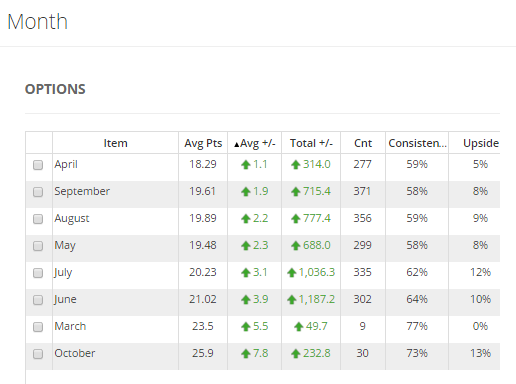Here at FantasyLabs, we’ve looked quite a bit at how to play NBA DFS during the different time periods of the season. Between this podcast about post-ASB NBA and Adam Levitan’s video on late-season NBA strategy, we obviously believe that variables change throughout a season and, as such, you should adapt your strategy, bankroll management, etc … accordingly.
While a lot of this is done for each sport at the end of each respective season, we don’t often think about how a sport is different at the beginning of a season. However, I think it’s equally as important.
Since MLB is starting in a mere couple of days, let’s look there. Vegas data – implied team points/runs, spreads, moneylines, over/under’s – is incredibly important for every DFS sport. Vegas line-setters are really good at what they do and as such, we can leverage their skill in setting accurate lines into free, efficient research for our DFS lineups. This is especially true in MLB.
However, even Vegas line-setters are susceptible to volatility. We see it every year – while Vegas “misses” a lot less often than a regular bettor, they still miss.
The question, then, is: can we take advantage of that fact?
If you think about that question in the way of “can I predict lines better than Vegas and thus spot inaccuracies?” … the answer is definitely “no.” However, DFS is a zero-sum game. In order to take advantage of Vegas misses, you don’t have to be better than Vegas – you just have to be better than your opponent. In the words of poker players: Don’t play your hand; play your opponent.
The Difference Between Important and Predictive Variables
This is how everything in DFS works – because of the nature of a zero-sum game, literally everything – every stat, every strategy, etc… — is important. This comes down to the difference between an important variable and a predictive variable. Let me give you an example.
Let’s say the public believed, and made decisions based on this belief, that MLB DFS player value was directly correlated with a player’s birthday and daily horoscope. Let’s say you are the only rational person in the world and know this is false. What do you do? Do you ignore every player’s horoscope because you know there isn’t a correlation?
I believe that would be quite foolish.
If a public believes in something and makes decisions as a result of that, whatever “that” is, is an important variable. Even if it’s not predictive – as in, horoscopes aren’t correlated with fantasy production – that doesn’t mean it’s not important to the DFS community. Because people are making decisions based on that variable – however flawed it may be – it’s important.
In fact, I would go so far to say that if the public believed that astrology and DFS value were so related as the example above, we at FantasyLabs would include it in our models. Again, that’s not to say it’s predictive – but it’s important.
Knowing where the public is on a variable, regardless of your thoughts on said variable, is key to zero-sum games. Even in this hypothetical world if you, as the only rational person, didn’t believe in this astrological correlation, you would still need to make decisions based on it. Even if that decision is to completely fade every player who is rated highly as a result of their horoscope, you still have to account for it – simply because the public does.
Early-Season Vegas Data
Let’s get back to Vegas and pose a question: when do you think it’s the hardest time of a season to accurately project lines? Of course – it’s at the beginning of the year, as we have less data.
Plus/Minus reflects this (ignore the incredibly small sample of March here):

This is the Plus/Minus of teams with a “Vegas Rating” of 80-100; in other words, teams that have really good matchups on that day. April has the lowest Plus/Minus of any month, which isn’t that surprising given our thought process that it’s just kind of hard to project games earlier in the season without data.
What makes this so important, though, is that the public will heavily use Vegas just as much in the early part of the season as they will in the mid to later parts.
Although the horoscope example was a bit drastic, the same sort of strategy can apply – because you know the public values Vegas so much (even in months where they should perhaps discount it a bit), you can thus make decisions based on that fact. In GPPs, for example, a very good early-season strategy would be to weigh Vegas data less than the public. Or perhaps stack teams with a low Vegas total.
Again: you don’t have to be better than Vegas to take advantages of their misses. You just have to be better than the public. And thanks to our Trends section and the data here at FantasyLabs, you can do exactly that. Don’t play your hand; play your opponent.





